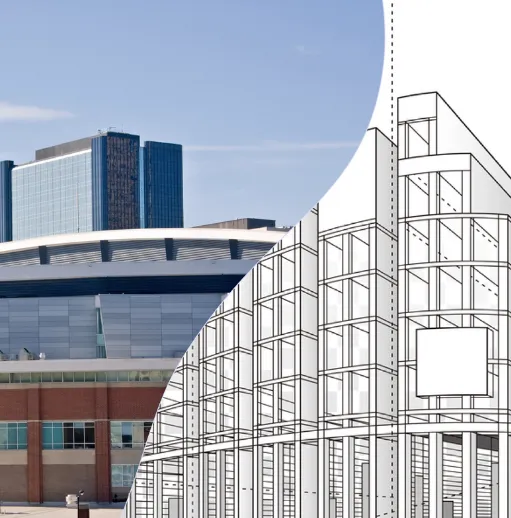
Why would a company want to hire an outside facility management company, adding to the costs associated with upkeep? It’s for a simple reason: The cost of not maintaining facilities is even greater. In the end, the workplace touches every part of business.
Leaving your facilities to languish or under-maintaining them generates costs you can’t always anticipate — most of them avoidable. A facility management company puts facilities first, helping you support people and processes, so you get the best returns on your investments across the organization.
Why do you need facility management?
You can think of the workplace as a second home for your employees — because it basically is. Most full-time employees spend a minimum of 40 hours a week at work, and for many of us, it’s even more.
While many have made the move to fully remote or the hybrid work model, the workplace is still most people’s “second place.” According to sociologists, the workplace is second only to the home. And it’s ahead of “third place” locations, including churches, cafes, bars, and community centers.
Facility management keeps employees’ home-away-from home neat and tidy, while making sure it meets their needs and expectations for work. Imagine asking employees to do their best work at a dingy desk that has an overflowing trash can beside it or asking a 10-person team to cram into a four-person workspace and collaborate comfortably. Companies should provide a workplace that’s clean, comfortable, accommodating, and safe.
Especially for organizations working on return-to-office campaigns, employees need spaces that make them excited about heading back to the office. By providing an exceptional workplace software, companies deliver a better employee experience, which helps them increase utilization and overall productivity, while attracting and retaining top talent.
Facility management also saves you money. With its focus on preventive and predictive maintenance, you avoid the costs of unexpected failures. It’s always going to be easier to find and fix small issues instead of undertaking major repairs. And when you can schedule work in advance, you can better control costs on inventory and labor.
You also cut costs that come with shorter life cycles. When assets and equipment last longer, you spend less on retiring, removing, and replacing them.
Why outsource facility management?
If it’s so important, why not do it yourself? Not every company has the means to provide an encompassing level of facility management in-house. The decision to outsource to facility management companies depends on a lot of factors, including:
- Cost
- Talent availability
- Technology
- Facilities
A company might not have the right skills on staff or facility management software. In some cases, the cost of investing in these resources might not currently make sense.
They might have a facility that’s small enough to require only weekly visits from a maintenance supervisor or technician. They might not need someone there day to day to keep things running smoothly. Or their real estate portfolio might be spread across a large area, making it hard to staff a single dedicated team.
The other major reason to outsource facility management is sheer convenience. Facilities require a lot of oversight. The ability to delegate most or all this oversight to a company whose sole focus is to deliver a superior standard of service often makes the best business sense. The less a company focuses on facilities, the more attention it can devote to other mission-critical efforts.
Facility management software
For companies that don’t necessarily want to invest fully in a management company or keep everything in-house, facility management software is important. There are opportunities within different applications to streamline in-house, low-level management and upkeep for facilities, as well as tools that help manage contracts and service-level agreements (SLAs) with vendors and management companies.
You can manage not only the tasks the company does itself but also any work when you need to bring in outside help. Even large facility management departments need help with support with fire suppression systems and elevators, for example, because of all the associated regulations and requirements for specialists.
It’s best when you have an all-in-one solution that’s easy for everyone to use and scales with the work. So, the built-in support ticket system can route everyday employee requests to in-house staff for quick attention and resolution — refilling towels in the bathroom, replacing light bulbs, fixing a broken door, and the like.
Conversely, the software is also useful for recordkeeping on vital building systems, and it allows in-house staff to either look after the work themselves or outsource the work to a service provider with timeliness and specificity.
Facility management software is an investment that generates a strong return on investment when leveraged into a broad facility management plan.
Integrated facilities management
One of the best reasons to work with a facility management company is to create an integrated facility management approach. Integrated facilities management connects real estate management services and costs into a single umbrella provider or as few as possible. It’s a method of simplifying facility management so there are fewer SLAs, more consistent terms, and a well-established partnership with defined expectations.
Integrated facilities management is popular with companies that want to outsource as much as possible to a facility management company. It’s a form of automation, with the expectation that the chosen facilities partner will tackle everything: from proactive maintenance to reactive repairs, as well as budgeting, capital planning, and reporting of core facilities metrics.
While bottom line savings and cost conservation are important initiatives for a company, so are strategic investments. Few investments offer a broader return than an investment in facilities and a partner to help maintain and manage them. Even companies with a facilities manager and trades on staff need to consider the benefits of working with a partner to emphasize total facility management.
As we enter a pivotal time for commercial real estate and space management, facilities upkeep is only becoming more important. Delegating upkeep or leaning on a service partner to maximize your facilities is a smart investment for the present and future.


